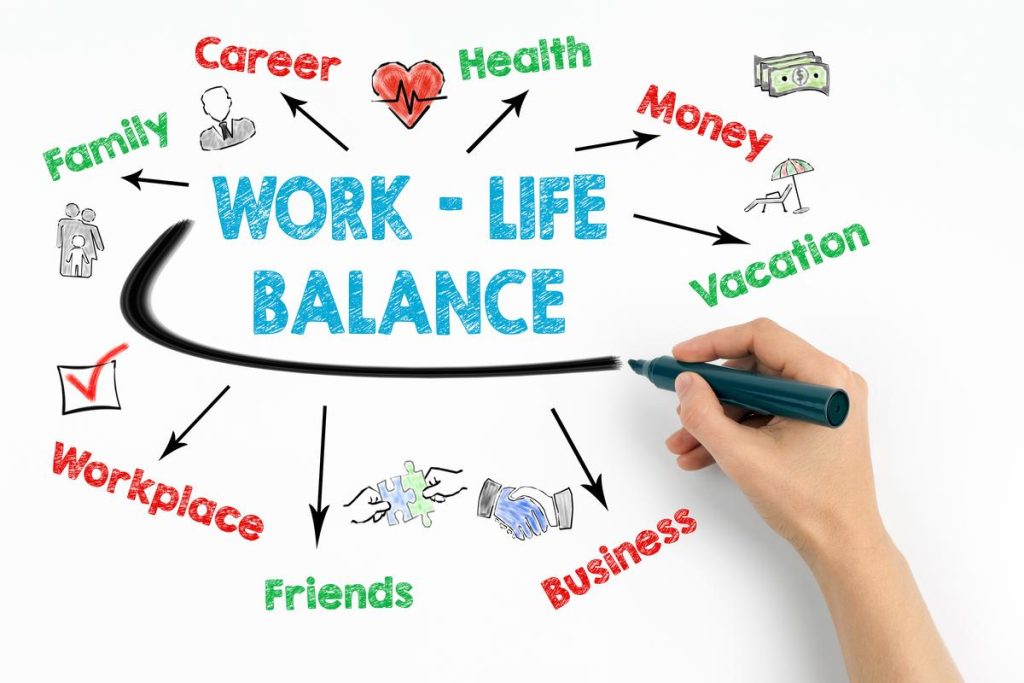Table of Contents
Introduction
In today’s fast-paced and demanding environment, many people find it difficult to strike a healthy work-life balance. The continuous search of career success, along with the continual connectivity made possible by technology, frequently blurs the lines between work and personal life, resulting in stress, burnout, and a lower quality of life. In this essay, we will discuss the significance of work-life balance, the factors that hinder it in today’s hectic environment, and practical ways for achieving and maintaining this state of equilibrium.
The Importance of Work-Life Balance
Work-life balance is an important component of total well-being. It includes the capacity to successfully manage and distribute time and energy between one’s work and personal duties. A healthy work-life balance provides various advantages:
- Stress Reduction: When work takes over our life, our stress levels can spike. Work-life balance provides for relaxation and stress reduction, which leads to improved mental and physical health.
- Improved Health: Chronic stress, which is frequently caused by an imbalance between work and personal life, can lead to a variety of health problems, including heart disease, anxiety, and depression. A balanced way of life improves psychological as well as physical health.
- Increased Productivity: Overworking can, paradoxically, contribute to lower productivity. Regular pauses and personal interests help refresh the mind, allowing one to be more focused and efficient at work.
- Improved Relationships: Ignoring personal relationships due to professional obligations can strain friendships, family alliances, and romantic partnerships. Work-life balance guarantees that we make time to cultivate and appreciate these relationships.

Work-Life Balance Factors
While the benefits of work-life balance are obvious, many things make it difficult to accomplish in our fast-paced world:
- Technological Advances: Because of smartphones and email, work can intrude on personal time, making it difficult to switch off and decompress.
- High Expectations: In today’s society, there are frequently high expectations placed on individuals to perform in their careers, which can lead to extended working hours and the pressure to prioritize work over personal life.
- Competitive Work Environments: Many businesses and organizations promote a competitive environment in which employees feel driven to work extra hours to keep up.
- Financial Pressure: The need to earn more money in order to meet rising living costs might force people to pursue several jobs or work excessive hours, leaving little time for leisure and family.
- Cultural Norms: A strong work ethic is valued above all else in some cultures, making it difficult for individuals to prioritise their personal lives.
Strategies for Achieving Work-Life Balance
Work-life balance is an individual experience, and what works for one person may not work for another. Individuals can, however, consider the following measures to assist them discover and maintain this equilibrium:
1. Create Boundaries
Create a distinct distinction between your personal and professional lives. Set aside specific work hours and resist from checking work emails or taking work calls outside of those times.
2. Consider Personal Care a Priority
Make personal care an unavoidable aspect of your routine. This includes regular exercise, a healthy diet, and enough sleep. Self-care gives the physical and mental strength required to effectively manage work and life.

3. Time Management
Manage your time effectively by setting calendars and to-do lists. Prioritize work based on priority and deadlines to free up time for personal hobbies.
4. Delegate and Seek Help
When at work, delegate jobs whenever possible and seek assistance when necessary. Lean on friends and family for support and aid with tasks in your personal life.
5. Unplug and Disconnect
Take technological breaks. To avoid distractions and the temptation to work, turn off business-related notifications during personal time.
6. Learn to Say No
Over commitment to job or personal obligations can lead to burnout. When your plate is already full, politely decline new duties or responsibilities.
7. Explore Flexible Work Arrangements
If your company allows it, explore flexible work arrangements such as remote work or flexible hours to better manage personal commitments.
8. Quality Over Quantity
Prioritize the quality of your job over the number of hours you put in. Long hours of ineffective toil are frequently trumped by efficient and effective effort.
9. Regularly Assess and Adjust
Assess your work-life balance on a regular basis to see whether it needs to be adjusted. Life conditions change, and what worked in the past may need to be modified to meet your current needs.
10. Seek Professional Help
If balancing work and personal life is proving difficult and negatively impacting your well-being, try seeking the advice of a therapist or counsellor.
Conclusion

Work-life balance is an important part of living a satisfying and healthy life in today’s fast-paced environment. It takes deliberate work, clear limits, and a dedication to self-care. While there are several reasons that impede work-life balance, the solutions presented in this essay can assist individuals in navigating the challenges and finding their own road to harmony. Remember that finding work-life balance is a continual effort that may necessitate constant modifications to match the changing demands of your career and personal life. Finally, pursuing work-life balance is an investment in your well-being and the route to a more fulfilling and sustainable way of life.